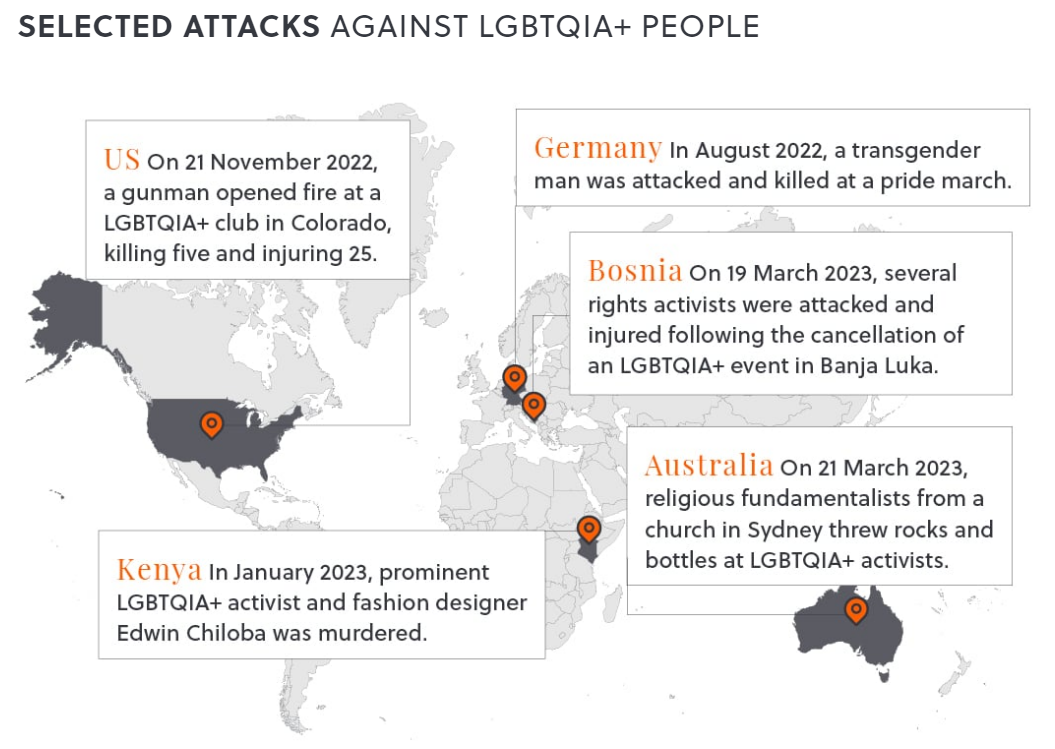Targeted: Anti-LGBTQIA+ attacks highlight travel concern
In the first three months of 2023, there have been numerous attacks against members of the LGBTQIA+ community. The International Lesbian, Gay, Bisexual, Transgender, and Intersex Rights Association (ILGA) reports a 12 percent increase in targeted hate crimes against the LGBTQIA+ community globally when compared to the same period last year. In South Africa, for example, police arrested four men in February 2023 for running a robbery and kidnapping syndicate that specifically targeted LGBTQIA+ people as easy targets. The men used LGBTQIA+-specific dating apps to target these people, with a major focus on foreign nationals. Also in February 2023, there were two separate incidents in which six gay men were attacked in Serbia by anti-LGBTQIA+ sympathisers linked to a far-right party. The group has regularly called for the eradication of LGBTQIA+ people from Serbian society. And in the US, the Human Rights Campaign civil society group reported “at least” 38 transgender people had been violently killed in 2022, noting that many deaths are misreported or unreported. Similar incidents in other parts of the world suggest that while global attitudes may be slowly shifting to greater acceptance of sexual minorities, the community still faces a greater threat of violence than others.
A CONFLICTING GLOBAL PICTURE
While reports of violent incidents and threats remain, global attitude surveys show that acceptance of the LGBTQIA+ community is steadily increasing. According to long-term tracking by the Williams Institute looking at how people in 175 countries treat LGBTQIA+ people, at least 56 countries have become more accepting of the community since 1980. The data also shows that Oceania, North and South America, and Western Europe have improved the most in terms of LGBTQIA+ acceptance when compared to other regions since 1990.
While there may be global improvements in LGBTQIA+ sentiment overall, progress is uneven, both at the country level and even within countries. Although seven out of ten US citizens support same-sex marriage, attitudes remain conservative, particularly in states such as Alabama, Arkansas, and Mississippi. Right-wing conservatism, religious fundamentalism, and generationally based cultural norms inform political and social attitudes, which can be seen as primary drivers of anti-LGBTQIA+ sentiment. Even within a generally liberal Western Europe, hostility toward the LGBTQIA+ community has resulted in violent attacks, fuelled by right-wing conservativism and populist politics in countries such as Belgium, France, the Netherlands, and the United Kingdom.

Norway, which is ranked third in the world by the Williams Institute study on LGBTQIA+ acceptance, recorded a mass shooting targeting a gay bar in June 2022; Ireland, ranked eighth, had a transgender woman almost beaten to death in February 2023; and in the same month in the UK, ranked ninth, the advocacy centre Birmingham LGBT was vandalised for the third time in two years. Even in countries with overall growing acceptance of LGBTQIA+ people such as Australia and New Zealand, ranked 10th and 11th, anti-LGBTQIA+ groups such as conservative churches and right-wing politicians are becoming increasingly vocal in their opposition to LGBTQIA+ communities.
Beyond violent attacks or threatening behaviour, increasingly hostile legislation targeting the LGBTQIA+ community in many parts of the world, and the regular discrimination in (or outright denial of) medical, social, and protective services, mean the travel security landscape for members of the community continues to be a challenging one. In light of these circumstances, being aware of local conditions and alert to potential threats will remain vital for LGBTQIA+ travellers.
